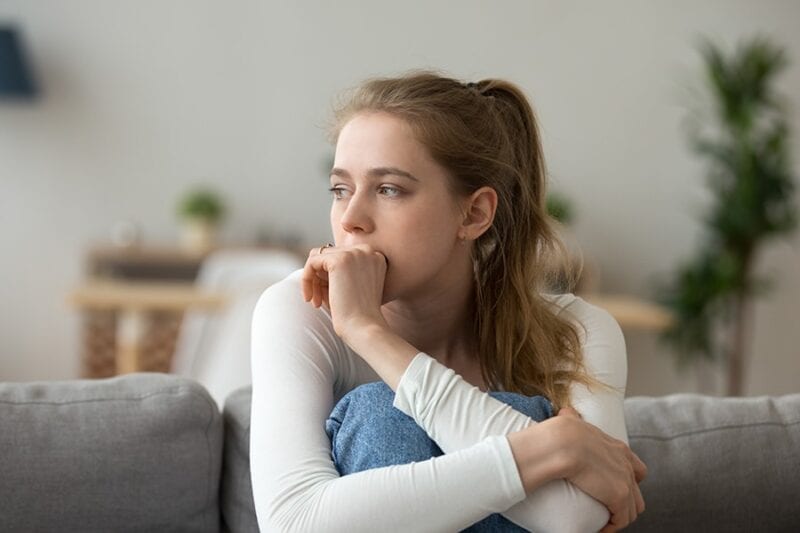Do you ever have trouble getting out of bed in the morning? Do you find yourself dreading the prospect of going to work? Or why do I have anxiety in the morning? Do you ever feel like the world is a little too scary and overwhelming to take on before you even get going?
The main reasons why you have anxiety in the morning include:
- Cortisol “stress hormone,” is higher in the first hour after waking due to:
- Stress from work
- Stress from school
- Relationships issues
- Coffee can lead to feeling anxious
- Taking lots of simple sugars or carbs
- Sign of general anxiety disorder
- Due to chronic stress
You’re ready to face the day with a smile on your face, but you just can’t shake that feeling that something awful is going to happen. If so, you’re not alone. Anxiety is a common feeling that many people experience and you’re not alone in that either.
Try as you might, you can’t shake that feeling that something awful might happen. That’s because anxiety is a normal reaction to stress or anxiety. It’s your brain’s way of keeping you safe and ensuring that you don’t do anything stupid or dangerous.
Understanding why you have anxiety in the morning can help you feel less anxious and more in control of your day. When you don’t have anxiety, it’s called a phobic reaction, which is something your brain tells you to keep you safe and protect you from harm. However, if you have anxiety in the morning, that’s called an anxiety disorder. In this article, you’ll learn what anxiety is, the different types of it, and the most common causes.

Contents
Why Do I Have Anxiety In The Morning?
There are a number of reasons why you can have anxiety in the morning. The following are the common causes:
- Cortisol “stress hormone,” is higher in the first hour after waking due to:
- Stress from work
- Stress from school
- Relationships issues
- Coffee can lead to feeling anxious
- Taking lots of simple sugars or carbs
- Sign of general anxiety disorder
- Due to chronic stress
The first thing to know is that anxiety in the morning, or in the early hours of the day, is common. Cortisol is often to blame. When you wake up in the morning, your brain releases cortisol. This hormone helps your body wake up and prepare for the day ahead. However, sometimes when you’re waking up, your cortisol levels are too high and this can cause anxiety symptoms.
There are some other reasons why you might be feeling anxious in the morning:
- You’re not getting enough sleep
- You’re starting a new job
- You need to get going on something important
- Your mind is racing from all of the thoughts you have about what you need to do today
- You’ve had a bad dream
- You just woke up from a nap
Why do I have the most anxiety in the morning?
People experience anxiety for a variety of reasons. One of the most common triggers is stress. Your cortisol levels are highest in the first hour of waking for people with an increased level of stress in their lives. Stress can come from everyday life, like your job or family relationships, and it can also be caused by traumatic events.
The morning is when we’re supposed to feel our most refreshed and ready to take on the day ahead. But it also happens to be when our anxiety levels are highest, which can make your morning routine even more difficult than normal.

Cortisol Awakening Response
The cortisol awakening response is a physiological and hormonal event that occurs when you wake up in the morning. Cortisol, also known as the “stress hormone,” will increase during this time to help your body deal with the stresses of waking up.
This increase in cortisol levels can be enough to make you feel anxious or maybe even depressed if you have an anxiety disorder. That’s because when cortisol levels are high, they stimulate our brain to produce more dopamine and adrenaline, which can lead to a release of serotonin as well as some other chemicals that are linked to depression and anxiety.
What causes the CAR?
Numerous factors can cause anxiety in the morning. It could be a result of an underlying mental health disorder, like depression or generalized anxiety disorder (GAD). It could also be a symptom of a lingering lifestyle factor, such as stress or sleep deprivation. That said, there are a few common causes of anxiety in the morning.
- Stress
- Sleep deprivation
- Lifestyle factors
- Underlying mental health disorders
- Lack of exercise
- Using stimulants before bedtime
Why does the CAR happen?
The CAR is a physical, emotional and cognitive response to the presence of anxiety. When we experience anxiety, our body might produce excess cortisol and adrenaline.
This can be very intense and make you feel like you’re going to have a panic attack. When it’s morning, your brain has just woken up from its restful sleep state, which means cortisol levels are still high. Increased cortisol levels in the morning can result in a more intense feeling of anxiety.
Can you fight the CAR?
Anxiety can be a difficult thing to deal with. There are so many different types of anxiety, and they all have the potential to make life difficult. One type of anxiety is called CAR, or chronic anxiety disorder. With this type of anxiety, you’ll constantly experience feelings of anxiousness throughout the day. Some people even experience it in the morning as they’re getting out of bed.
So what causes this feeling? Why do so many people feel anxious in the morning?
It’s unclear exactly why some people struggle with anxiety in the morning more than others, but there are several theories about why it happens. One theory is that people who have stressful jobs might startle themselves awake with their own thoughts about work-related anxieties.
Another theory is that some people wake up with an exaggerated sense of panic because of stress from last night’s dream, which wakes them up suddenly and makes it harder for them to go back to sleep.
And finally, one more thing could be contributing to your morning anxiety: caffeine withdrawal! Caffeine might make you feel more alert and awake when you drink it in small amounts throughout the day, but when your body becomes used to drinking coffee on a regular basis, your brain will increase production of adrenaline (a hormone stimulated by caffeine). This can lead to increased feelings of anxiousness in the morning until your body has time to adjust after waking up.
What to do when you have anxiety in the morning

If you’re someone who struggles with anxiety in the morning, there are plenty of things you can do to help.
- One of the most effective treatments for anxiety is exercise. Exercise has been proven to be an effective method for attenuating the symptoms of anxiety. Exercise releases endorphins that make your body feel good and also increase your heart rate for a short period of time.
- It’s important to start small and work your way up. Start with something like going on a short walk or doing some light stretching before getting out of bed. If you’re more experienced, try some light jogging outside or a yoga video on Youtube.
- Moreover, it’s important to reduce caffeine intake. Caffeine stimulates the brain making anxiety worse. You can avoid caffeine every time you get anxiety in the morning.
- In addition, you can ensure that you have a morning routine. This means waking up at the same time and doing the same things. This way, your body never gets anxious since it is used to a routine every morning.
- The other thing to do when you often experience morning anxiety is to get enough sleep. Sleep enables your body to balance all the hormones in the body including cortisol. It also helps you to heal any ailing body organs and also relax your body and brain.
- Finally, if the anxiety in the morning is extreme seek treatment. A doctor may conduct counseling, CBT, or offer medication depending on the severity and frequency of the symptoms.
Tips for beating anxiety in the morning
There are many factors that can contribute to anxiety in the morning. What you eat, how much sleep you get, your work-life balance, and other factors can all play a role. The key to beating anxiety is figuring out what causes it for you and tackling those issues one at a time.
If you’re struggling with anxiety in the morning because of a lack of sleep, make sure to prioritize getting enough sleep every night. Routines like waking up at the same time or not checking your phone before bed will help ensure that you fall asleep more easily.
If caffeine or sugar is causing your anxious thoughts in the morning, try limiting or cutting those out of your diet to see if they’re impacting your anxiety levels. If it’s stress-related, try reducing stressors like work deadlines or parenting responsibilities.
And if all else fails, remember that everyone feels anxious sometimes – even people who seem “cool.” It’s okay to feel anxious; it’s what we do with our feelings that determines whether we feel better or worse about them.
How to stop morning anxiety
If you struggle with anxiety, here are some ideas to help you stop feeling anxious in the morning. If you get enough sleep, limit your alcohol and caffeine intake, eat a healthy diet that limits processed food and sugar, and reduce stress at work and home- these are all good ways to help reduce anxiety.
Another way is to meditate in the morning. You can set an alarm on your phone to go off at a certain time so that when it rings you can sit in complete silence for 5 minutes. This can be a great way to start your day-even if it’s only for 5 minutes! A lot of people feel really refreshed after meditating. It’s also been shown as helpful for people with anxiety.
While it may seem like a daunting task early in the morning when you’re not fully awake yet, try taking deep breaths or exercising before getting out of bed-these could be great ways to help lower your anxiety levels naturally without medication. And if these methods don’t work, talk to your doctor about trying medication like Xanax or Lexapro.

What can I take in the morning for anxiety?
If you wake up feeling anxious, there are some things you can do to help ease the discomfort. You should eat a healthy breakfast that is high in magnesium-rich foods like oatmeal or banana.
You should also avoid drinking caffeine and getting active in the morning. And finally, establish a morning routine that makes you feel comfortable and happy. All of these things will mitigate any anxiety you might experience when waking up.
Does morning anxiety go away?
Yes, morning anxiety is highly treatable. This is besides the fact that most people have a feeling like the symptoms of morning anxiety are overwhelming and permanent.
In fact, most people who have morning anxiety can identify the cause and resolve their symptoms by undergoing cognitive-behavioral therapy (CBT). CBT is a form of psychotherapy that focuses on changing your thoughts and feelings about a situation to help you cope with it. The therapist will work with you to identify your triggers and teach you coping strategies for when you find yourself in an anxious state.
Why do I wake up at 3 am with anxiety?
When you have anxious thoughts in the morning, your sympathetic nervous system might be activated, triggering a “fight or flight” response in your body. This is one of the reasons why it can be difficult to get out of bed during an anxiety attack. It’s also important to note that any type of physical or emotional stress can trigger this fight-or-flight mode.
Nervous system functions can be broken down into two types: the autonomic nervous system and the somatic nervous system. The autonomic nervous system has two systems that are activated when you experience anxiety in the morning, which are the sympathetic and parasympathetic nervous systems.
Why do I wake up with anxiety in my stomach?
One of the most common causes of anxiety in the morning is a condition called Irritable Bowel Syndrome (IBS). Some people diagnosed with IBS experience anxiety in their stomach when they wake up. Anxiety affects the digestive system and this can lead to stomach pain, appetite changes, and more. In some cases, the symptoms are so severe that sufferers need a bag for their bowel movements.
Additionally, cortisol is highest in the first hour of waking for people with an increased level of stress in their lives and anxiety affects the digestive system. This heightened level of cortisol can cause a person to feel nauseous or anxious in the morning, which leads to a negative feedback loop that intensifies over time.
And finally, morning anxiety can be caused by sleeping too much or sleeping too little. If you sleep eight hours at night, you might not get tired until later on in the day, leading to an anxious feeling as your body is no longer accustomed to waking up early.
If you sleep less than six hours each night then your body will need time to adjust before it naturally wakes up refreshed and ready to go. You might experience anxiety due to being tired while also experiencing withdrawal from not getting enough sleep at night.
How do I go back to sleep after waking up with anxiety?
Getting back to sleep after waking up with anxiety may take some effort. Some of the things to do include:
You might have to get out of bed and move or try breathing exercises. Some people find that meditation works for them, too. It all depends on what you need to help you relax your muscles and fight back against the anxiety that has taken over your body.
Moreover, you should avoid bright lights and loud sounds since they can activate the brain fully. In other people, focusing on something boring can help them get back to sleep. This is because your brain will just not get excited by something boring like counting sheep or fixating on a boring thing in your bedroom.
Finally, avoid checking your phone, laptop, or clock. The Blue light from the phone, tablet, or laptop can lead to insomnia.
What does waking up with anxiety feel like?
Many people experience anxiety in the morning. The feeling is often characterized by nervousness or worry. You might also feel restless, on edge, or wound up.
Often, these feelings will dissipate after a few minutes of being awake and starting your day. If you have an anxiety disorder and are struggling to cope with your daily life, these feelings may be a sign that something more serious might be going on.
Bottom line
Anxiety is a natural reaction to stress, but it can be overwhelming and debilitating. It’s important not to dismiss anxiety as something that everyone experiences. There are a number of causes for anxiety in the morning including:
- Cortisol “stress hormone,” is higher in the first hour after waking due to:
- Stress from work
- Stress from school
- Relationships issues
- Coffee can lead to feeling anxious
- Taking lots of simple sugars or carbs
- Sign of general anxiety disorder
- Due to chronic stress
Anxiety disorders are real illnesses, with unique symptoms and needs that require treatment. An anxiety disorder makes you feel like you have no control over your life.
FAQs
What are morning anxiety attacks?
Morning anxiety attacks are panic attacks that occur in the morning or when waking up. It’s hard to pinpoint what causes them. Anxiety in the morning is most common in people who suffer from Generalized Anxiety Disorder (GAD), a chronic condition that involves excessive worry and tension.
Why do I have anxiety in the morning?
This feeling of dread can be caused by a number of different things, like stress about work, school, family conflicts, or personal issues. Mostly, it is associated with Cortisol Awakening Response. It could also be caused by more serious things like an untreated mental illness such as depression, bipolar disorder, or schizophrenia.
How do I fight my anxiety in the morning?
To fight your anxiety you should try to break it down into small steps and take one at a time. You’ll feel less overwhelmed if you remember that you can tackle everything one step at a time. You can sleep well, exercise, reduce caffeine intake, have a daily routine, and eat well-balanced meals. Moreover, you can talk to a doctor if the symptoms are severe and frequent.
Another way to combat your feelings of fear is to practice exposure therapy – this will help you get used to the idea of getting out of bed. If it helps, make sure you wake up before your usual alarm time so your brain isn’t shocked with an abrupt wake-up call.

